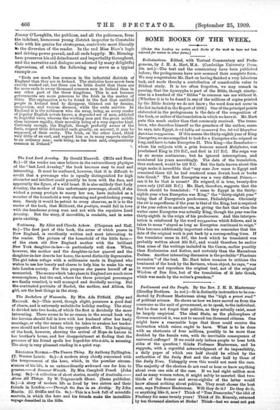SOME BOOKS OF THE WEEK.
[Under this heading we notice such Books of the week as have not beet reserved for review in other forms.] Ecclesiasticus. Edited, with Textual Commentary and Prole- gomena, by J. H. A. Hart, M.A. (Cambridge University Press. 10s. net.)—The text and the commentary have been published before ; the prolegomena have now assumed their complete form. We may congratulate Mr. Hart on having finished a very laborious task, and made thereby a contribution of considerable value to Biblical study. It is too often forgotten, we may remark in passing, that the Apocrypha is part of the Bible, though ninety- nine in a hundred of the " Bibles " in common use are without it. (Whether it is to be found in any of the millions of copies printed by the Bible Society we do not blow ; the word does not occur in the list included in the Report of 1909.) One of the principal points elaborated in the prolegomena is the date of the composition of the book, or rather of the translation in which we have it. Mr. Hart puts this much earlier than that commonly received. The trans- lator, who describes himself as the grandson of the author, came, he says, into Egypt, es ZI.AJcp teal Tinatcoo.Teii fTet ?s-t Tab' Ebery6-ou Baoti401s. otryxpoplaas. If this means the thirty-eighth year of King Euergetes, we are compelled to look for a Euergetes who reigned so long, and have to take Euergetes II. This King—the Benefactor— whom his subjects with a grim humour named Malefactor, was proclaimed King in 170 B.C., and died in 117 B.C. His reign was by no means continuous ; but he ignored interruptions, and numbered his years accordingly. The date of the translation, thus reckoned, would be 132 B.C. But the facts known about this reign make it incredible that "any sane Jew came to Egypt and remained there till he had rendered some Jewish book or books into Greek." The first Euergetes was a very different Prince,— can it be he that is meant? He reigned, it is true, twenty-five years only (247-222 B.C.) Mr. Hart, therefore, suggests that tho Greek should be translated : "I came to Egypt in the thirty- eighth year when Euergetes was King," tho " thirty-eighth year" being that of Euergetes's predecessor, Philadelphus. Obviously the isrl is superfluous if the year is that of the King, but is required if the year refers to another era, as giving the fact that when the writer came Euergetes was actually King, though the year was the thirty-eighth in the reign of his predecessor. And this interpre- tation is reinforced by the word o-tryxpookras which follows, and is taken to mean " stayed as long as Euergetes continued to reign." This becomes additionally important when we remember that the date of the original work is put back by a corresponding time. If the translator came in 247, the book which he translated was probably written about 300 B.C., and would therefore be earlier than some of the writings included in the Canon, earlier possibly than Ecclesiastes and Esther, and certainly than the Maccabean Psalms. Another interesting discussion is the probable "Pharisaic recension " of the text. Mr. Hart takes occasion to criticise the treatment of the book by the Revisers, whose object, he says, "was to recover and reproduce the original text, not of the original Wisdom of Ben Sire, but of the translation of it into Greeks which was made by the writer's grandson."










































 Previous page
Previous page